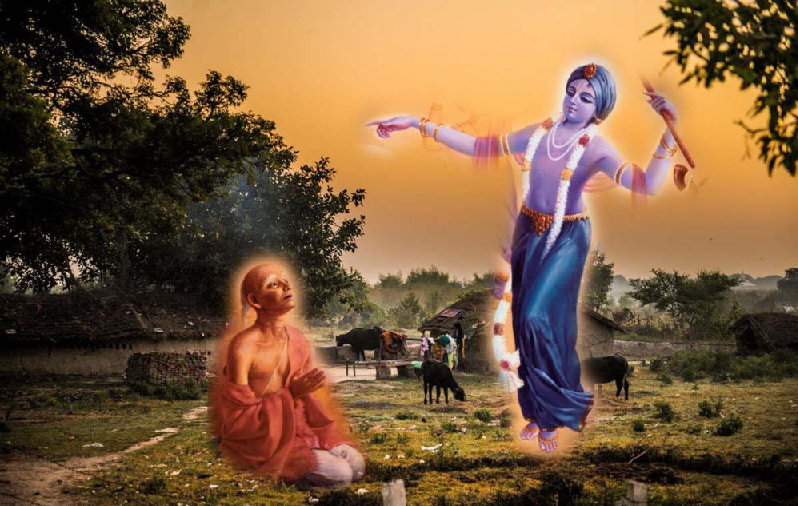“We take the “color” of God and Who is better than God in coloring, (and whose color is better than God’s)?”
– (The Holy Koran 2.138)
To develop a tangible relationship with God,its helpful to not only accept that God is a person but He also has a beautiful transcendental form.
“But ….” I can hear your doubt, “Christianity and Islam, the two most wide spread religions condemn this thought process?”
In truth they don’t. While most practicing Muslims or Christians may find this blasphemous, their holy scriptures however don’t deny the form of God.
Bible and Koran accepts God has a form
The Bible explains “Under His feet” (Exodus 24.10), “Inscribed with the finger of God”(Exodus 31.18) “The hand of Lord” ( Exodus 9.3), “The ears of the Lord”( Numbers 11:1), “The eyes of the Lord”( Genesis 38.7). Furthermore the Bible also hints at God having the semblance of the human form. The Ezekiel (1.26) declares “Man is made in the image of God”
The Koran too mentions that God, Allah has a form. The face of Allah (55.27), Eyes of Allah (20.39, 96.14, 52.48, 54.14), hands of Allah ( 38.75, 39.67, 48.10) and the throne of Allah (69.17, 57.4) are revealing that albeit we may not be able to see God’s form, He nevertheless has a form.
Even a hard core Muslim cannot deny the importance of the Hadiths. It’s absolutely essential for a Muslim to keep faith in Koran and the authentic Hadiths of which the Shai Al Bukhari and Shai Al Muslim are the most prominent. And these scriptures describe ‘seeing’ Allah (1.12.770) very clearly on the day of resurrection and also His form is mentioned (6.60.105, 8.76.577)
Form of God in Vedic scriptures
And the Vedic scriptures contain detailed descriptions of God’s form. The Srimad Bhagavatam explains how the Lord’s enchanting beauty captivates the hearts of devotees and frees them from material hankerings. God’s smile (3.28.32), laughter (3.28.33) and interactions with devotees (10th canto) have been captured brilliantly in this immortal classic.
Why Jesus or Mohammed didn’t reveal God’s form?
But one may doubt why the Bible or the Koran is not emphatic about this? That’s because Jesus for whatever little he preached, was crucified. He instructed his followers that he had lot more to reveal but since they weren’t qualified, he didn’t do so. “I have yet many things to say unto you, but ye cannot bear them now” (John 16.12). Even prophet Mohammed for the little he taught he had to flee from Mecca due to threat to his life. Prophet Mohammed said, “I received two kinds of knowledge: one of these I taught but if I had taught them the other, it would have broken their heart”( Reincarnation and Islam, Nadar Beg Mirza, Madras 1927). The Hadiths further describe that Prophet Mohammed received three kinds of knowledge: the knowledge that the Lord ordered him to conceal from others, the second He allowed him to choose-whether to share or not and the third He ordered the apostle to communicate to all members of his community. (Geo Widengern, Mohammed, the Apostle of God and his ascension, Uppasla, 1955, page 108). Since the men of the Qureshi tribe to which the prophet belonged were backward and barbaric fighters, they were given only the basic instructions that were needed for them to raise their consciousness. Therefore the Koran instructs its followers “Do not have sex with your mother or sister”(4.23).
But when we read the Srimad Bhagavatam we see that the audience was highly self-realized. Therefore Krishna declares in the Bhagavad Gita, “I shall now declare unto you in full this knowledge, both phenomenal and numinous. This being known, nothing further shall remain for you to know” (7.2)
The analogy of a teacher and the dictionary
Thus one can see that the basic instructions of these scriptures are the same in terms of loving God, yet the details related to the form of God being revealed is only in the Vedic scriptures. It’s akin to a math teacher who is learned but teaches his students according to their capacity to understand, and also as per the time and circumstances. All prophets were messengers of God but they taught as per their audience’s capacity to digest this message. And just as a small dictionary and an unabridged chambers dictionary would contain similar words, yet the Chambers would contain words that wouldn’t be found in the smaller dictionary. Similarly Koran and Bible contain the same knowledge that the Vedas contain. Yet the Vedic scriptures contain additional information about God like the details of His form and the way to pray to Him.
The Koran quote above is interesting; the men of the Qureshi tribe to whom the Lord’s message was relayed by Mohammed were dark complexioned. And Krishna, the God of Hindus too is dark complexioned…]]>



